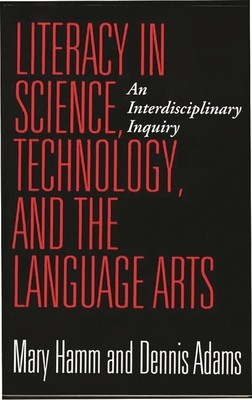
- We will send in 10–14 business days.
- Author: Dennis Adams
- Publisher: Praeger
- ISBN-10: 0897895762
- ISBN-13: 9780897895767
- Format: 15.6 x 23.4 x 1.1 cm, softcover
- Language: English
- SAVE -10% with code: EXTRA
Literacy in Science, Technology, and the Language Arts (e-book) (used book) | bookbook.eu
Reviews
Description
Technology, a product of science, is pushing against the linear boundaries of traditional storytelling. Moving in the direction of multiform stories and digital formats takes literacy well beyond the 3Rs. Students increasingly need to be critical and creative users of the new media. As the Internet becomes faster, more visually powerful, and easier to manipulate there will be an explosion of virtual environments, with literacy taking on a whole new meaning. While the word literacy has become almost synonymous with the word competence, the authors prefer the definitions found in the new language arts and science standards. For example, the National Science Education Standards suggests that scientific literacy implies that a person can identify scientific issues underlying national and local decisions and express positions that are scientifically and technologically informed.
As this book explores important new dimensions of linguistic and scientific literacy it looks at developing literacies not covered well in schools today. It is the authors' belief that an understanding of science and the processes of science can make major contributions to the ability to learn, reason, make decisions, and solve problems. Thus learning about the natural world helps develop intellectual tools of inquiry that can be used with the language arts and other disciplines. Interdisciplinary activities can help develop the skills in both science and language that are becoming so essential for personal fulfillment, performing in the workplace, and being an informed citizen.
This book is designed as a supplementary text for methods classes in elementary science and language arts education. It is also intended as a resource and guide for preservice and inservice elementary and middle school teachers.
EXTRA 10 % discount with code: EXTRA
The promotion ends in 20d.04:38:25
The discount code is valid when purchasing from 10 €. Discounts do not stack.
- Author: Dennis Adams
- Publisher: Praeger
- ISBN-10: 0897895762
- ISBN-13: 9780897895767
- Format: 15.6 x 23.4 x 1.1 cm, softcover
- Language: English English
Technology, a product of science, is pushing against the linear boundaries of traditional storytelling. Moving in the direction of multiform stories and digital formats takes literacy well beyond the 3Rs. Students increasingly need to be critical and creative users of the new media. As the Internet becomes faster, more visually powerful, and easier to manipulate there will be an explosion of virtual environments, with literacy taking on a whole new meaning. While the word literacy has become almost synonymous with the word competence, the authors prefer the definitions found in the new language arts and science standards. For example, the National Science Education Standards suggests that scientific literacy implies that a person can identify scientific issues underlying national and local decisions and express positions that are scientifically and technologically informed.
As this book explores important new dimensions of linguistic and scientific literacy it looks at developing literacies not covered well in schools today. It is the authors' belief that an understanding of science and the processes of science can make major contributions to the ability to learn, reason, make decisions, and solve problems. Thus learning about the natural world helps develop intellectual tools of inquiry that can be used with the language arts and other disciplines. Interdisciplinary activities can help develop the skills in both science and language that are becoming so essential for personal fulfillment, performing in the workplace, and being an informed citizen.
This book is designed as a supplementary text for methods classes in elementary science and language arts education. It is also intended as a resource and guide for preservice and inservice elementary and middle school teachers.


Reviews